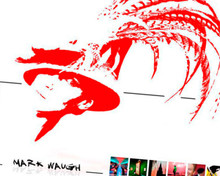
Waugh, regional photographer of the year at the Picture Editor Awards 2007, was the last staff photographer standing at the Guardian Media Group (GMG) title, before being made redundant in September.
Now he has gone freelance, to brave new territory and test the wider commercial market. Journalism.co.uk caught up with him to find out more.
Though Waugh has already secured commissions for the Guardian, he is well aware of the limitations for news photographers. He is focusing on 'arty' work, and hopes 'there's still a market for the nicer end of stuff '.
"I've been doing slideshows - recording people's voices and putting them into an audio slideshow," he explains.
Waugh spent 20 odd years standing next to reporters on the job, and now he is doing some interviewing himself: "It's something I'd always wanted to do. I'm enjoying doing those and it's a new skill."
But as yet, he's not sure of the commercial viability: "The BBC are the only people I can find who are commissioning that sort of thing. The Guardian do some lovely slideshows but from jobs they've already commissioned."
"Because of the state of the industry I am looking at moving away from newspapers completely in a few years time," he adds. "Possibly become studio based and go fully into commercial photography, I don't know."
Wider industry
It's sad, but this industry is just getting worse and worse, he says, with fewer staff jobs at newspaper to prove it.
Would he recommend the profession to young people? "I was told not to get into it - so somebody was right!" he jokes. "There are fewer opportunities to get into it, but it's still a great job for all it's badly paid."
Hopefuls 'have to be realistic' and realise they're not likely to pick up a staff position, he says. "I think there will be a lot of people coming and going."
More generally, there's less emphasis on doing a good job, he says, citing YouTube and mobile phones as contributory factors.
"People now accept if there's a terror attack in Britain it's going to be a mobile phone picture that gets it first," he says.
"On YouTube you'll watch really poor quality video because it's funny. The BBC will use a really badly filmed piece that years ago they would never have put on."
Perhaps it is because it is easier to click away, he says: "I look [at photos online] all the time to try and be inspired by people's work, [but] you see an amazing picture online and you just flick past it."
"If somebody hands you a beautiful print you'll sit and study it for a bit longer, but in its electronic form it is very easy to press the next button and see what's coming behind it."
Free daily newsletter
If you like our news and feature articles, you can sign up to receive our free daily (Mon-Fri) email newsletter (mobile friendly).









